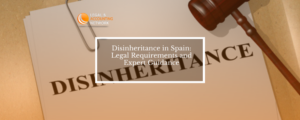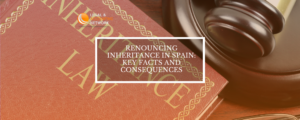1. Who are the forced heirs?
They are those who cannot be excluded from the inheritance of a deceased person as they are at least entitled to the legal share, which is a portion of the testator’s assets reserved by law and which cannot be freely disposed of. They are also known as legitimate heirs.
The legitimate portion cannot be forsaken when the testator is alive, but once the testator has died, it is possible to relinquish the inheritance, but the waiver of this right must be clear and express in order to be effective before the law and must be made before a notary. Furthermore, the renunciation must be total, as it is not possible to accept only part of the inheritance and renounce another part.
In addition to the heirs (compulsory and voluntary), the inheritance can also include legatees who receive only specific assets or items from the inheritance, i.e a house, a car, etc.
There are two situations depending on whether they have acquired the status of heir in a will or without a will.
1.1. Forced heirship in wills
- On the one hand, there are voluntary heirs, which are those were the person who is going to inherit is expressly stated, i.e. the testator voluntarily names someone as his or her heir.
- And then the forced heirs who, as was explained at the beginning, are those people who inherit by law because they have a reserved portion (legitima) which is at least 1/3 of the estate.
- Among the forced heirs we find in the first place the children in marriage or not, and also those who have been adopted, in second place their descendants (grandchildren) and in the absence of these, parents and ascendants. Lastly, the widow/widower will inherit in the legally established manner.
1.2. Forced heirship without a will;
In this case the heirs of the person who dies are always forced heirs.
It is important to clarify that the testator cannot strip the legal share to the forced heirs, except for established causes of disinheritance, which will be discussed below.
2. What situations can arise depending on whether there are descendants, ascendants, etc. in the inheritance?
Let’s analyse the possible situations that may arise
2.1. If there are descendants.
In this case, the inheritance will be divided in three thirds, two thirds will be the legitimate portion of the estate and the remaining third will be the free disposition (which is a part of the inheritance in which the testator can give it to whomever he wants, with or without a relationship, whether he is a legal heir or not).
The two thirds of the legitimate portion of the estate are formed by the third of improvement and the third of the strict legitimate portion.
The legitimate portion (2/3 of the estate) will be inherited by the legal heirs.
The third corresponding to the strict legitimate portion must be distributed in equal parts among all the forced heirs.
The third of improvement which may be inherited, as long as it is stated in the will, only by some of the legal heirs.
If the deceased did not grant a will, all the legal heirs will inherit in equal shares.
This distribution shall not affect the widowed spouse who shall be entitled to the usufruct of the third of improvement which shall have an economic value to be paid in cash or by awarding him/her a specific asset.
2.2. If there are no ascendants but there are descendants.
In this case, the legitimate share of the ascendants is half of the estate and if there is a widowed spouse, the legitimate share of the ascendants will be 1/3 and the widowed spouse will be entitled to the usufruct of half of the estate which, as has already been explained, can be paid in cash or by the award of some asset.
2.3. If there are no ascendants but there are descendants.
In this last case, the testator can do whatever he wants with his assets and the rest of the relatives would become the heirs, but only if there is no living widowed spouse, who in this case will have the right to the usufruct of 2/3 of the estate.
3. Frequently asked questions about forcerd heirship
What happens if there is no will and no relatives? Who inherits?
The Central Estate by means of a judicial declaration in which it declares itself as the heir, otherwise it will not be able to inherit.
But the Central Estate must act according to a stablished protocol once it inherits, which is to distribute one third of the inheritance to municipal institutions of charity, social action, professional, public or private institutions, another third to institutions of the same characteristics but at the provincial area, and the last third to cancel public debt unless the Council of Ministers determines another application.
In Spain, is it possible to disinherit a child?
In general, no, since a child is by law a forced heir, however, it is possible in very exceptional cases, taking into account that it also differs according to the Autonomous Community, in Navarre for example, it is legal to disinherit children.
Disinheritance and causes.
It is important to bear in mind that this action must be carried out through a will and be for one of the causes listed in the Civil Code, as if it is not a justified cause, the forced heir cannot be dishinherited.
- Disinheritance of descendants.
This can happen if the descendants have denied material support to the parents without just cause or mistreated them and inflicted serious verbal abuse. In addition, court rulings have made it clear that psychological abuse can be a cause for disinheritance as well. - Disinheriting the spouse.
Serious and/or repeated breaches of conjugal duties. Incurring in the causes for the loss of parental authority. Denying material support to the other spouse or to the children of both spouses. And lastly, having tried to kill the spouse. - Disinherit parents and ascendants.
Having legally lost parental authority. Denying maintenance to children or descendants, without just cause. When a parent has tried to kill the other parent. And of course, having incurred in abandonment, prostitution or corruption of the the children.






